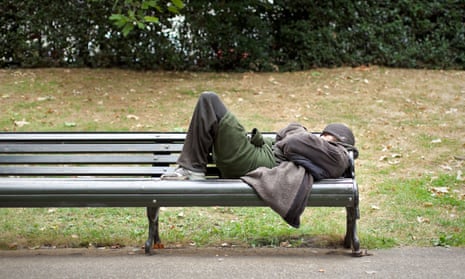Rushcliffe borough council in Nottinghamshire has introduced spot fines for extreme cases of anti-social behaviour under the public space protection order (PSPO) powers given to councils by the Anti-social Behaviour, Crime and Policing Act 2014. Reports claimed the council planned to issue £100 spot fines to homeless people – the council countered that these fines would be used as a last resort. But the terms under which the council states it will enforce these powers are vague and subjective: while many people will not be affronted by the sight of a rough sleeper on a bench, for others a homeless person bedding down in a park is seen as threatening their use of public space.
The use of PSPOs has accurately been described as a form of wide-ranging anti-social behaviour order (asbo) for public behaviour and space. Author Bradley Garrett points out that while “asbos were directed at individuals, PSPOs are geographically defined, making pre-defined activities within a mapped area prosecutable.” No surprise then that the people most often targeted by these new powers, which forbid certain behaviour in designated spaces such as drinking and congregating (or “socialising” as ordinary people might call it), are often the most marginalised and scapegoated in society.
Hackney council planned to introduce a PSPO with a clause targeting rough sleeping in 2015, and public anger forced a backtrack, although it admitted it would not rule out future PSPOs. Exeter city council used the powers to confiscate 57 tents from homeless people in the city in 2015. Freedom of Information requests by Vice magazine earlier in the year revealed 1 in 10 councils are using PSPOs in essence to criminalise homelessness.
Homelessness has complex causes, and entrenched homelessness presents particular difficulties: the reasons people sleep on the street are myriad, and many people simply don’t want the help offered to them. The rate of mental health problems reported in the single homeless population is extremely high – 80% of homeless people report a mental health problem. Homeless people who refuse help are often those who need more complex outreach, rather than being castigated and threatened with fines.
Rushcliffe council’s response to media reporting on its PSPO proposals says: “The £100 fixed penalty notice is very much a last resort and would only be given out to people who are acting in an anti-social way, are refusing support and assistance from the council and relevant charities.” It doesn’t take a genius to understand that all people are different, and despite their dehumanising treatment homeless people are too: not everyone will want to accept the outreach offered, and threatening someone in a dire situation with a fine is both cruel and unworkable. Good luck enforcing legal action against a person with no fixed abode, let alone a postal address for a court summons.
But amidst this spirit-dampening, boneheaded bureaucratic tide is a sign of hope: each time a council tries this, the public are furious. While local government may treat homeless people as an irritant, a problem to be dealt with that is no less annoying than tackling rising damp in your house or sitting through a root canal procedure at the dentist, their residents are up in arms.
The fury is two-fold: that homelessness can still exist, and that homeless people are treated so cruelly, crated off, fined and swept from public view. Seeing people sleeping in shop doorways is uncomfortable, but the answer is not for the police to harry them into shadowed alleyways away from the public gaze but to help them – and end homelessness. Fining homeless people for being homeless is akin to breaking your friend’s good leg because they’re hopping while the other is in plaster, or setting someone’s car on fire because it’s got a flat tyre. It doesn’t help, and the logic has departed entirely from the Act. Luckily the public don’t have any truck with it, and the groundswell of anger about homelessness can hopefully translate into pressure to end it, for every homeless person, for good.
Sign up for your free Guardian Housing network newsletter with news and analysis sent direct to you on the last Friday of the month. Follow us:@GuardianHousing

